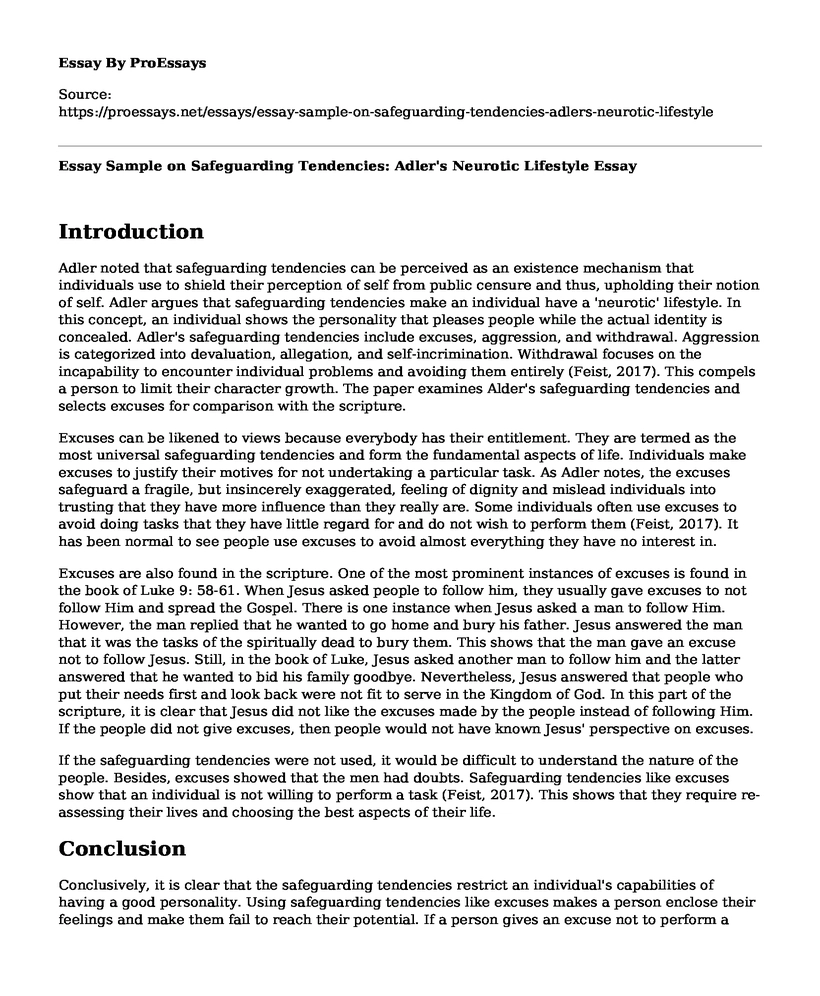Introduction
Adler noted that safeguarding tendencies can be perceived as an existence mechanism that individuals use to shield their perception of self from public censure and thus, upholding their notion of self. Adler argues that safeguarding tendencies make an individual have a 'neurotic' lifestyle. In this concept, an individual shows the personality that pleases people while the actual identity is concealed. Adler's safeguarding tendencies include excuses, aggression, and withdrawal. Aggression is categorized into devaluation, allegation, and self-incrimination. Withdrawal focuses on the incapability to encounter individual problems and avoiding them entirely (Feist, 2017). This compels a person to limit their character growth. The paper examines Alder's safeguarding tendencies and selects excuses for comparison with the scripture.
Excuses can be likened to views because everybody has their entitlement. They are termed as the most universal safeguarding tendencies and form the fundamental aspects of life. Individuals make excuses to justify their motives for not undertaking a particular task. As Adler notes, the excuses safeguard a fragile, but insincerely exaggerated, feeling of dignity and mislead individuals into trusting that they have more influence than they really are. Some individuals often use excuses to avoid doing tasks that they have little regard for and do not wish to perform them (Feist, 2017). It has been normal to see people use excuses to avoid almost everything they have no interest in.
Excuses are also found in the scripture. One of the most prominent instances of excuses is found in the book of Luke 9: 58-61. When Jesus asked people to follow him, they usually gave excuses to not follow Him and spread the Gospel. There is one instance when Jesus asked a man to follow Him. However, the man replied that he wanted to go home and bury his father. Jesus answered the man that it was the tasks of the spiritually dead to bury them. This shows that the man gave an excuse not to follow Jesus. Still, in the book of Luke, Jesus asked another man to follow him and the latter answered that he wanted to bid his family goodbye. Nevertheless, Jesus answered that people who put their needs first and look back were not fit to serve in the Kingdom of God. In this part of the scripture, it is clear that Jesus did not like the excuses made by the people instead of following Him. If the people did not give excuses, then people would not have known Jesus' perspective on excuses.
If the safeguarding tendencies were not used, it would be difficult to understand the nature of the people. Besides, excuses showed that the men had doubts. Safeguarding tendencies like excuses show that an individual is not willing to perform a task (Feist, 2017). This shows that they require re-assessing their lives and choosing the best aspects of their life.
Conclusion
Conclusively, it is clear that the safeguarding tendencies restrict an individual's capabilities of having a good personality. Using safeguarding tendencies like excuses makes a person enclose their feelings and make them fail to reach their potential. If a person gives an excuse not to perform a task every time, they may miss out on chances that may transform their lives. In the Scripture, the case provided shows that the men wanted to give excuses not to follow Jesus.
Reference
Feist, J. (2017). Theories of Personality. McGraw-Hill Higher Education.
Cite this page
Essay Sample on Safeguarding Tendencies: Adler's Neurotic Lifestyle. (2023, Mar 07). Retrieved from https://proessays.net/essays/essay-sample-on-safeguarding-tendencies-adlers-neurotic-lifestyle
If you are the original author of this essay and no longer wish to have it published on the ProEssays website, please click below to request its removal:
- Articles Summary on Autism Spectrum Disorders
- The Principal Concepts and Theories of Personal and Professional Development
- Essay Example on Dreams: Maintaining Emotional and Mental Balance
- Essay Sample on Maslow's Pyramid: A Guide to Human Needs Hierarchy
- Essay Example on Freud's Impact: Shaping Psychology of Today
- Essay Sample on the Best Day of My Life
- Agape and Philautia: Symbiosis or Parasitism?







